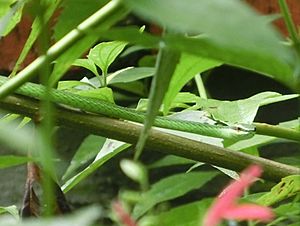Uromacer facts for kids
Quick facts for kids Uromacer |
|
|---|---|
 |
|
| Uromacer catesbyi | |
| Scientific classification |
|
| Kingdom: | Animalia |
| Phylum: | Chordata |
| Class: | Reptilia |
| Order: | Squamata |
| Suborder: | Serpentes |
| Family: | Colubridae |
| Subfamily: | Dipsadinae |
| Genus: | Uromacer A.M.C. Duméril, Bibron & A.H.A. Duméril, 1854 |
Uromacer is a group of snakes, also known as a genus, that are special because they only live on the island of Hispaniola. This island is shared by two countries: the Dominican Republic and Haiti. These snakes belong to a larger snake family called Colubridae.
Discovering Uromacer Snakes
Uromacer snakes are often called "vine snakes" because they are long and slender, just like vines. This shape helps them move easily through trees and bushes. They are known for their pointed snouts, which is why some of their common names include "pointed snake."
Where Uromacer Snakes Live
These unique snakes are endemic to the island of Hispaniola. This means they are found naturally nowhere else in the world. They live in different parts of the island, including both the Dominican Republic and Haiti. Their slender bodies and pointed heads help them blend in with the plants where they live.
Types of Uromacer Snakes
Scientists currently recognize three different types, or species, of Uromacer snakes. Each one has its own unique features and common names.
- Uromacer catesbyi (Schlegel, 1837)
- This snake is often called the blunt-headed Hispaniolan vine snake or Catesby's pointed snake.
- Uromacer frenatus (Günther, 1865)
- This species is known as the slender Hispaniolan vine snake or island pointed snake.
- Uromacer oxyrhynchus (A.M.C. Duméril, Bibron & A.H.A. Duméril, 1854)
- This one is called the sharp-nosed Hispaniolan vine snake or simply the pointed snake.
When you see a name like "(Schlegel, 1837)" after a snake's scientific name, it means that the scientist Schlegel first described this snake in 1837. If the name is in parentheses, it means the snake was first placed in a different group of snakes before being moved to the Uromacer genus.
See also
 In Spanish: Uromacer para niños
In Spanish: Uromacer para niños

